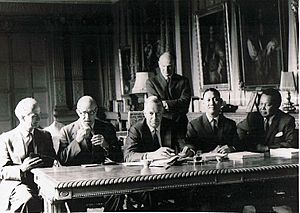Cobbold Commission facts for kids
Quick facts for kids Report of the Commission of Enquiry, North Borneo and Sarawak, 1962 |
|
| Created | 17 January 1962 |
| Ratified | 21 June 1962 |
| Location | The National Archives, Kew, Richmond, Surrey TW9 4DU, United Kingdom |
| Authors | The Commission of Enquiry, North Borneo and Sarawak, 1961-1962 |
| Signers | |
| Purpose | The formation of Malaysia, 1961–1963 |
The Cobbold Commission was a special group set up to find out what people thought about forming a new country called Malaysia. This group checked if the people in North Borneo (now Sabah) and Sarawak wanted to join.
The idea was to create Malaysia from several places. These included Malaya, Brunei, Singapore, North Borneo, and Sarawak. The Commission also helped write the new country's laws, called the Constitution of Malaysia. This happened before Malaysia was officially formed on 16 September 1963. The group was led by Lord Cobbold, who used to be in charge of the Bank of England.
Who Was in the Commission?
The Cobbold Commission had five main members:
- Lord Cobbold: He was the chairman, meaning he led the group. He was once the Governor of the Bank of England.
- Wong Pow Nee: He was the Chief Minister of Penang.
- Ghazali Shafie: He worked as a top official in the Ministry of Foreign Affairs.
- Anthony Abell: He used to be the Governor of Sarawak.
- David Watherston: He was a former Chief Secretary of Malaya.
What Did the Report Say?
The Commission shared its findings and ideas on 1 August 1962. They decided that Malaysia should be formed. Lord Cobbold also made it clear that all parts joining the new country should be equal partners.
Lord Cobbold had also written a private letter to the British Prime Minister, Harold Macmillan. In it, he said that forming Malaysia would be good if Singapore also joined. He felt that a country made only of Malaya and the Borneo areas (North Borneo and Sarawak) without Singapore would not be as strong.
Here's a simple way to understand what the Commission found about what people wanted:
- About one-third of the people in North Borneo and Sarawak really wanted Malaysia to happen soon. They didn't worry too much about the details.
- Another one-third also liked the idea of Malaysia. But they wanted certain conditions and protections. If these conditions were met, they would strongly support the plan.
- The last one-third was split. Some wanted their areas to become independent first before joining Malaysia. Others wanted British rule to continue for a few more years.
The report noted that if the conditions asked for by the second group were met, most of them would support Malaysia. Also, once a final decision was made, many from the third group would likely accept it. However, a small group, about 20% in Sarawak and a bit less in North Borneo, would always be against Malaysia unless they got independence first.
See also
- 18-point agreement (Sarawak)
- 20-point agreement (Sabah)
- Reid Commission
- Nine Cardinal Principles of the rule of the English Rajah


